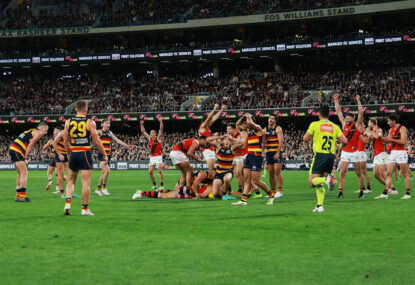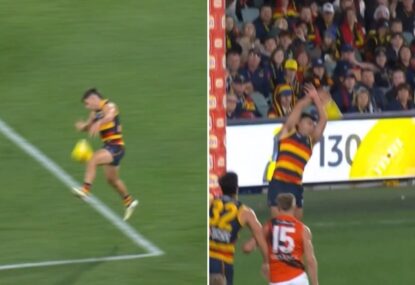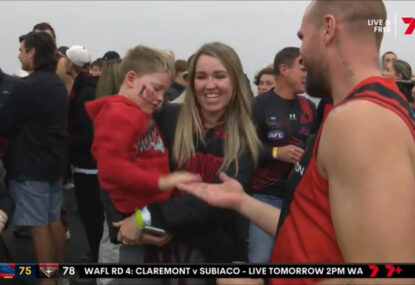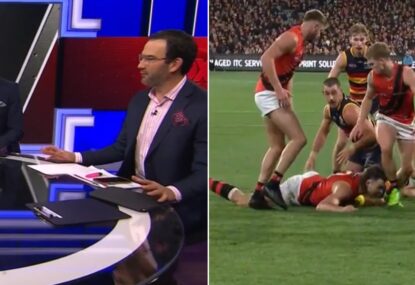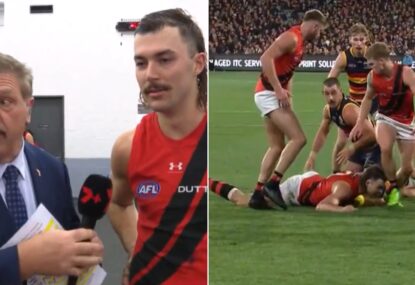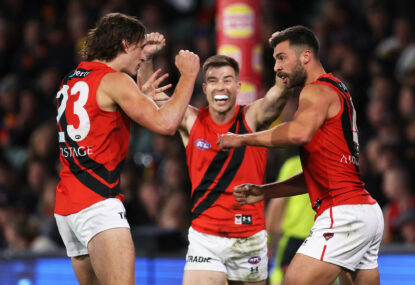The S team is surprisingly light for scoring options, but with a midfield as good as this, there will be plenty of opportunity.
Back line
Bernie Smith (Geelong 1948-58)
183 games, three goals
Starting his career at West Adelaide, Bernie Smith was already a star centreman by the time he crossed to Geelong in 1948. He continued in the centre for a few years before coach Reg Hickey repositioned him to the back pocket in 1951. To say Smith took to the position well is an understatement – a best and fairest, a Brownlow Medal, and a near best-on-ground performance in a premiership were all his by the end of the year. Smith played in a second premiership in 1952, and won another best and fairest in 1956. His dash and creativity when rebounding from the defensive 50 led to some coaches implementing defensive forwards for the first time. Smith captained the club in 1954, and was named as back pocket in both the Geelong and the VFL/AFL Team of the Century.
Stephen Silvagni (Carlton 1985-2001)
312 games, 202 goals
In an era of great full forwards, Stephen Silvagni stood alone as the top defender of the era. Nicknamed ‘SOS’ or ‘Son of Serge’, Silvagni’s strength and body positioning enabled him to spoil balls he had no right to reach, while his aerial ability saw him take some spectacular marks – none more so than his mark of the year in 1988 over Craig Starcevich. Twice he won best and fairest awards, and he was a runner up in the Brownlow Medal in 1990. Silvagni was capable of making an impact up forward, kicking five or more goals eight times with a best of ten against Fitzroy in 1993. He won premierships in 1987 and 1995, and was named All Australian five times. Silvagni was a perhaps controversial choice at full back in the VFL/AFL Team of the Century, but his selection in the same position of the Carlton and Italian Teams of the Century sparked very little argument.
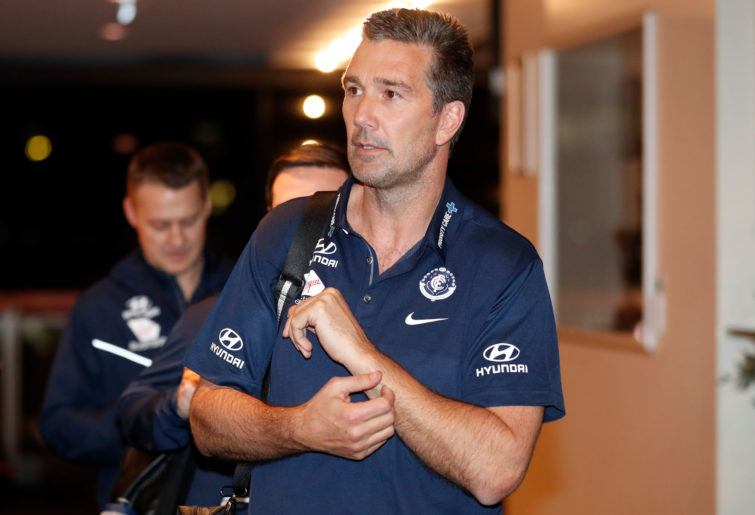
(Photo by Michael Willson/AFL Media/Getty Images)
Charlie Sutton (Footscray 1942, 1946-56)
173 games, 65 goals
Charlie Sutton was the spiritual leader of Footscray for a decade, owning a place in history as the club’s first premiership captain. He started his career as a centreman or rover, but once shifted to the back pocket his toughness and dashes from the back line created an upturn in the Bulldogs’ fortunes. Sutton won the club’s best and fairest in 1950, led the club’s goal kicking in 1951, and in the grand final of 1954 implored his charges to concentrate on the ball while he flattened Demons opponents. He coached the club on two unsuccessful occasions, but his position as back pocket in Footscray’s Team of the Century was never in question. The club’s best and fairest awards was renamed the Charlie Sutton Medal in 1955.
Half back line
Rohan Smith (Footscray 1992-2006)
300 games, 254 goals
One of the core members of the Bulldogs sides that just couldn’t quite get over the premiership hump in the late 1990s, Rohan Smith beating the MCG turf after the 1997 preliminary final is probably the defining image for the club’s era. A hard-running and long-kicking wingman or half back, Smith could run forward for a handy goal, as tallies of 31 in 1999 and 42 in 2000 show. He was named All Australian twice, and played for Victoria in three straight years, winning the Whitten Medal in 1998. Smith announced his retirement prior to the 2006 finals series, and the Bulldogs allowed him to leave on a milestone 300 games.
Matthew Scarlett (Geelong 1998-2012)
284 games, 17 goals
Although Matthew Scarlett is more often known as a full back, he was a very different style of defender to Stephen Silvagni with his ability to zone off and intercept attacking forays, so I have moved him up the ground to centre half back. He started his career slowly, before finishing second in the club best and fairest in 2001 and winning it in 2003 – the first of six All Australian years. Scarlett was runner up again in the 2004 and 2005 best and fairest, before being an integral part of Geelong’s three premierships. In 2009, his deft toe poke to Gary Ablett set up the decisive goal immediately and etched itself into folklore. Scarlett retired in 2012 and has returned to the club as assistant coach.
Heath Shaw (Collingwood 2005-13, GWS 2014-)
324 games, 42 goals
One of three Shaw brothers to be drafted as a father-son pick in the early 2000s, Heath Shaw has served two clubs with distinction and flair and shows few signs of slowing down. With a debut late in 2005, Shaw quickly became noted for his ball-winning and running skills out of the back line, finishing fourth in the best and fairest in his first full season. He continued in this consistent vein of form throughout, and despite a few off-field issues, he came third in the best and fairest in 2009 and made an immediate impact in the 2010 grand final replay by smothering a Nick Riewoldt attempt at goal. Shaw was traded to GWS in 2013, and the veteran presence in the back line was especially welcome for the young side as he won a best and fairest in 2015, being named All Australian in 2015 and 2016. His consistent form has continued throughout the past few years and Shaw could continue through to 2021.
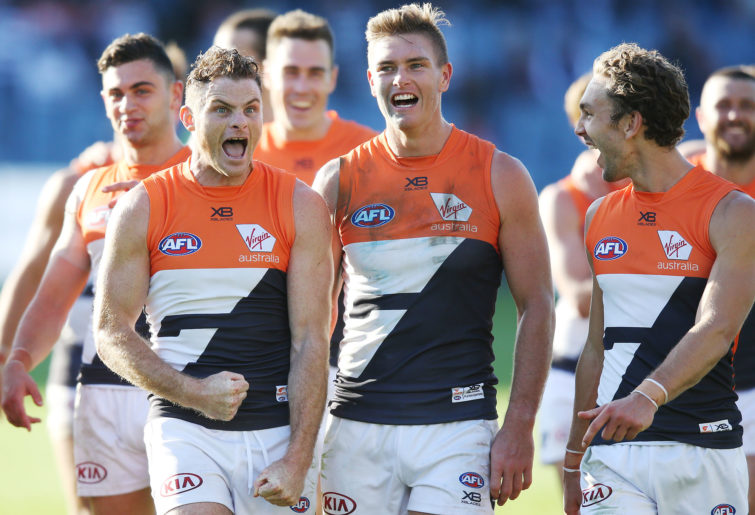
(Photo by Michael Dodge/Getty Images)
Centre line
Wayne Schwass (North Melbourne 1988-97, Sydney 1998-2002)
282 games, 154 goals
Wayne Schwass won the Morrish Medal as best and fairest in the under-19 competition in 1987, while he captained North Melbourne to a premiership that same year. Moving up to the seniors, he became known as a prolific and consistent wingman who always used the ball well. Schwass won club best and fairest awards in 1994 and 1995 before winning a premiership in 1996. After being traded to Sydney, he had possibly his best year in 1999, winning a best and fairest and being named All Australian for the only time in his career. He continued to be a guiding hand for the younger Swans until his retirement in 2002 due to injury. His work since retirement in highlighting battles with depression has been commendable and an important part of the footy fabric.
Ian Stewart (St Kilda 1963-70, Richmond 1971-75)
205 games, 80 goals
A member of no less than five Teams of the Century, Ian Stewart was a centreman who could kick well with both feet and was incredibly resilient in a tough era. He first came to VFL attention when outpointing Brownlow medallist Alistair Lord in 1962 when playing for Tasmania, and soon after crossing to St Kilda made a great connection with Darrel Baldock during one of St Kilda’s greatest eras. Stewart won two best and fairests for the Saints, Brownlow medals in 1965 and 1966, and was a driving force in the 1966 premiership. As the decade ended, his star began to wane, but upon transfer to Richmond he found his mojo again. Winning a third Brownlow medal and a best and fairest in 1971, Stewart also played in the 1973 premiership before an aborted retirement in 1974 and a final end in 1975. Stewart was named in the centre of the VFL/AFL, St Kilda, Tasmanian and Italian Teams of the Century, and on the bench of Richmond’s Team of the Century.
Tony Shaw (Collingwood 1978-94)
313 games, 157 goals
The sixth of October 1990 was the best day of Tony Shaw’s career. Not only did he lead Collingwood onto the field as captain, he led the Magpies to a drought-busting victory as well as picking up the Norm Smith Medal for best afield. It was the culmination of a career that had seen the undersized Shaw become noted for his tenacity and leadership skills, ball-getting ability, and intelligence on the field – plus of course his habit of stirring opponents! He captained the club from 1987 to 1993 and won best and fairest awards in 1984 and 1990 before breaking the club record of games played in his final season. Shaw was named on the bench of Collingwood’s Team of the Century.
Ruck line
Aaron Sandilands (Fremantle 2003-19)
271 games, 98 goals
The tallest man to ever play league footy, Aaron Sandilands’ body didn’t always allow him to stay on the field but when it did there were few more imposing in the ruck. While his tap work didn’t always lead to Fremantle dominance in the midfield, he led the league in hit outs on three occasions and provided a handy linkman when transitioning to attack. Sandilands’ best year was 2009, when he was named All Australian on one of four occasions, won the Geoff Christian Medal for best player at a WA club, and the first of his two club best and fairest awards. After his second best and fairest in 2015, injuries dotted Sandilands’ career until retirement. He was named as ruckman in Fremantle’s 25 since 95 team.
Joel Selwood (Geelong 2007-)
305 games, 160 goals
One of four Selwood brothers to enter the league, Joel Selwood has overshadowed the others with his remarkable consistency and success since being drafted in 2006. Unflinching and hard in the trenches, Selwood stepped into the Geelong midfield in his first season and was so impactful that he won the Rising Star award with a near-unanimous score and he was involved in the first of three premierships. His willingness to put his head over the ball has been reflected by being named the Most Courageous Player four times by his peers, to go with three best and fairest awards and six All Australian nominations. Selwood was named captain in 2012 and continues to hold the role, with little indication that he will be retiring soon.
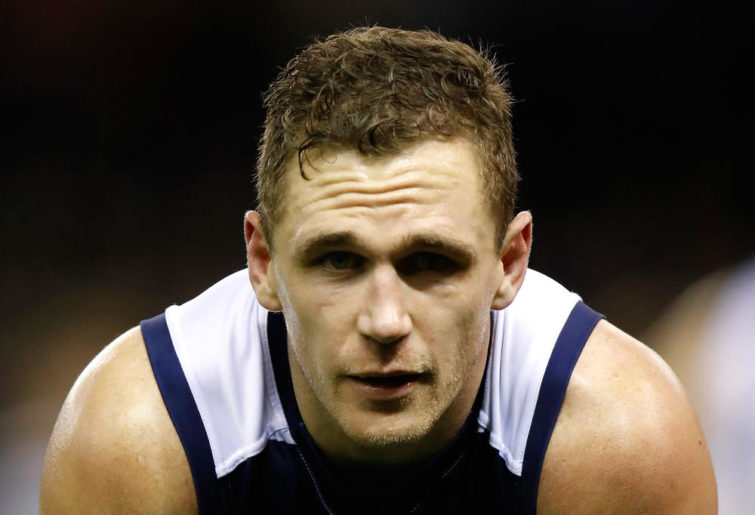
(Photo by Michael Willson/AFL Media/Getty Images)
Bob Skilton (South Melbourne 1956-71)
237 games, 412 goals
One of the most courageous and loyal players ever, Bob Skilton has often said that he would trade everything he achieved in the game for a premiership. And he achieved a lot – three Brownlow Medals, an incredible nine best and fairest awards, 25 Victorian guernseys, ten years as captain and three club goal kicking awards. Skilton was equally skilled by hand or foot on both sides of the body, and often played through injuries that would see other players sidelined for weeks. The closest he got to a premiership was a losing semi-final in 1970, by which time he was near the end but still one of the best afield with 27 touches. Skilton was inducted as an inaugural AFL Legend, and was named as rover in the VFL/AFL and South Melbourne Teams of the Century.
Half forward line
Wayne Schimmelbusch (North Melbourne 1973-87)
306 games, 354 goals
Wayne Schimmelbusch came to North Melbourne ready-made after two seasons with Brunswick in the VFA, and quickly set about making his name as a fearless runner who could kick a long goal. He led North’s goal kicking in 1976, and played in the Kangaroos’ premierships of 1975 and 1977. In 1979, Schimmelbusch was appointed captain and held the role up until his retirement in 1987. Interestingly, he never won a best and fairest award, but was revered at North Melbourne for his courage, skill and longevity. When he retired, he was North’s games record holder, and continued to be until Glenn Archer overtook him in 2007. Schimmelbusch was named on the half forward flank of North Melbourne’s Team of the Century.
Paul Salmon (Essendon 1983-95, 2002, Hawthorn 1996-2000)
324 games, 561 goals
Almost inevitably for a man standing over two metres tall and with a suitable surname, Paul Salmon became known as the ‘Big Fish’. At Essendon he played as a full forward rotating into the ruck with the likes of Simon Madden, leading the club’s goal kicking seven times. Salmon’s imposing presence saw him kick 63 goals in just 13 games in 1984 before a knee injury derailed his career. He made a comeback in 1985, playing in that year’s premiership as well as the flag in 1993. After the 1995 season, Salmon was traded to Hawthorn, where he made an immediate impact in the ruck, winning two best and fairest awards and being named All Australian in 1997. He retired in 2000, but was persuaded to come back for one last hurrah for Essendon in 2002. Salmon represented Victoria on 14 occasions, and was named on the bench of Hawthorn’s Team of the Century.
Steele Sidebottom (Collingwood 2009-)
243 games, 166 goals
Steele Sidebottom kicked ten goals in a best-on-field performance in the 2008 TAC Cup grand final, which is why I have slotted him in at half forward here. As a wingman with great skills and an ability to keep calm under the toughest pressure, he looked at home very early on in his career and was runner up in the Norm Smith Medal in only his second year – he was the youngest player in Collingwood’s 2010 premiership. He has continued a successful and consistent run of form throughout the decade, winning best and fairest awards in 2017 and 2018, being named All Australian in the latter year and finishing second in the Brownlow. Sidebottom has had an interrupted 2020, but shows no sign of slowing down just yet and is one of a few veteran Magpies leading a younger batch through.
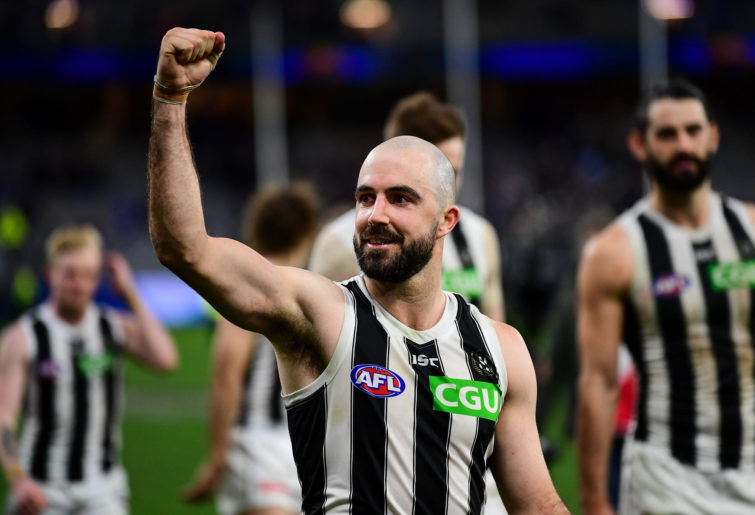
(Photo by Daniel Carson/AFL Photos via Getty Images)
Forward line
Norm Smith (Melbourne 1935-48, Fitzroy 1949-50)
227 games, 572 goals
Although Norm Smith is these days known as the coach of the VFL/AFL Team of the Century and the man for whom the medal for best on ground in the grand final is named, his performance as a player is more than sufficient to find a spot here. As an intelligent full forward, Smith was noted for his ability to bring other players into the game with a handy tap, deft pass or tough shepherd. He was still good enough to lead the club’s goal kicking four times and play in premierships in 1939, 1940, 1941 and 1948. Smith won best and fairest awards in 1938 and 1944, and crossed to Fitzroy as captain-coach for a few years before returning to the Demons and the most dominant period of any team in league history.
Peter Sumich (West Coast 1989-97)
150 games, 514 goals
Peter Sumich was the West Coast spearhead for the first half of the 1990s, kicking 111 goals in 1991 to be the Eagles’ only century goal kicker (as well as the first left footer to hit the ton) and leading the club’s goal kicking in seven of his nine years. However, despite his success he is best remembered for a goal he didn’t kick – a behind in the 1990 qualifying final forcing a draw instead of a West Coast win and letting Collingwood off the hook. Sumich played in all three Eagles grand finals of 1991, 1992, and 1994, kicking 13 goals in these three games, and retired as West Coast’s goals record holder until being overtaken by Josh Kennedy. He was named as full forward in West Coast’s teams commemorating ten, 20 and 25 years.
Dane Swan (Collingwood 2003-16)
258 games, 211 goals
Nuggety, hard-running, tenacious, surprisingly strong overhead and with a limitless desire to get the ball, Dane Swan was equally dangerous in the middle of the ground or up forward. After a slow start to his career, he had a breakout season in 2007 with almost 600 possessions and he never looked back. Swan was a prime mover in Collingwood’s 2010 premiership and was considered a hot favourite for the Brownlow Medal that year, but had to wait until 2011 to take that award home. He won three Collingwood best and fairest awards, and was named All Australian five times. He retired in 2016 after a debilitating foot injury.
Interchange
Don Scott (Hawthorn 1967-81)
302 games, 133 goals
If not for the efforts of Don Scott, we may be talking about the Melbourne Hawks. His act of ripping off a velcro hawk from a proposed Melbourne Hawks jumper stands as one of the defining off-field images of the 1990s. On the field, he was equally as passionate and vigorous. As a slightly undersized ruckman, Scott was able to use his body extremely effectively, and played in three premierships and captained two of them. He won a best and fairest in 1973, and captained the club from 1976 to 1980. Scott was named as ruckman in Hawthorn’s Team of the Century.
Ross Smith (St Kilda 1961-72, 1975)
234 games, 230 goals
Ross Smith was one of the hardest running rovers in the league during his peak at St Kilda, during which time he won a premiership in 1966 and a Brownlow Medal in 1967. Conspicuous for his courage on attacking the ball, he prided himself on his fitness and was rewarded by being named captain in 1970. Smith won two best and fairest awards and captained the Victoria squad in 1972 before moving across to WA as captain-coach of Subiaco. He returned for one last season as playing assistant coach for St Kilda and had an unsuccessful year at the reins in 1977. Smith was named as rover in St Kilda’s Team of the Century.
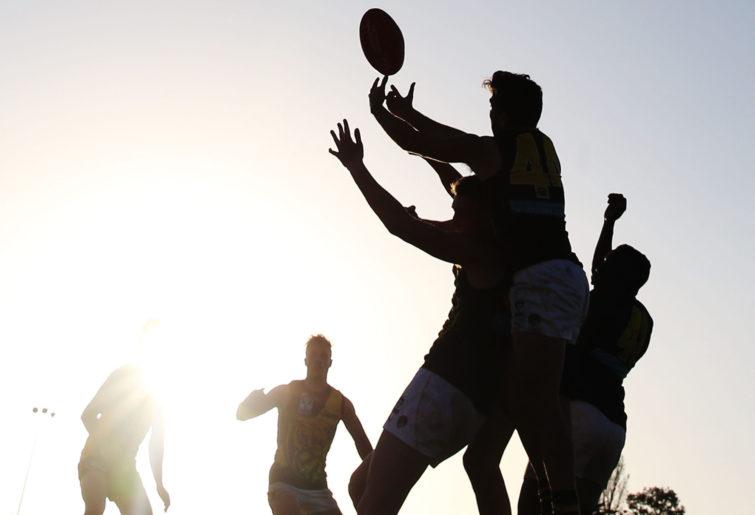
(Photo by Michael Dodge/AFL Media/Getty Images)
Anthony Stevens (North Melbourne 1989-2004)
292 games, 127 goals
Starting his career as a tagger, Anthony Stevens developed in the midfield to such an extent that he became well known as one of the toughest members of the Kangaroos’ midfield. He won two best and fairest awards and played in the 1996 and 1999 premierships – his efforts to be named fit for the 1999 grand final after a fractured ankle are part of North folklore. During the 2000 pre-season Stevens was injured by falling glass outside a hotel, but he recovered to be named captain in 2002 after the departure of Wayne Carey due to an affair with Stevens’ wife. He retired in 2004 and was named as ruck rover in North Melbourne’s Team of the Century.
Jim Stynes (Melbourne 1987-98)
264 games, 130 goals
From Round 18, 1987 to Round 9, 1998, Jim Stynes’ name would be part of the Melbourne squad. His 244 consecutive games remains the league record, and is testament to Stynes’ supreme fitness and courage. Undoubtedly the most successful Irishman to play Australian rules, he was a ruckman who could run off his opponent or get in the trenches himself to get the ball. In 1991 he won the Brownlow Medal as the first and so far only non-Australia-born player to do so, and won four best and fairest awards during his career. Stynes’ work with the Reach Foundation has been instrumental in helping young Australians with their mental health. He was named on the bench of Melbourne’s Team of the Century.
Emergencies
Geoff Southby (Carlton 1971-84)
268 games, 31 goals
It takes something special to break into a side that won a premiership the year before and win a best and fairest award – let alone back up the next year with another award – but Geoff Southby managed it. An attacking full back who often used the torpedo punt to kick out after a behind, Southby was good enough to represent Victoria regularly throughout the 1970s. Some contract and role disputes disrupted his career in the latter part of the decade, but he returned to good form and played in the 1979 premiership. Unfortunately Southby missed the 1981 and 1982 flags through injury, but he fought on for a few more seasons before retiring. Southby was named as back pocket in Carlton’s Team of the Century – certainly a close call with Stephen Silvagni!
Kade Simpson (Carlton 2003-)
342 games, 138 goals
Kade Simpson is one game away from retirement, finishing with the third most games played in Carlton’s history in one of its worst periods. As the first player picked by the club in the 2002 draft after the salary cap penalties were handed down, Simpson was on a hiding to nothing early on, and so it proved when he had no touches in his first three games. In game number four, he kicked goal number one and soon developed a reputation for excellent skills and boundless courage. A Rising Star nomination followed in 2005. Simpson played primarily on the wing or as a rebounding half back whose consistency was appreciated within Carlton’s walls and was respected across the league. He won a best and fairest award in 2013, finished second in 2016, and represented Australia in four International Rules series. As a Carlton fan I’m going to miss him next year when the ever-present number six isn’t out there any more.
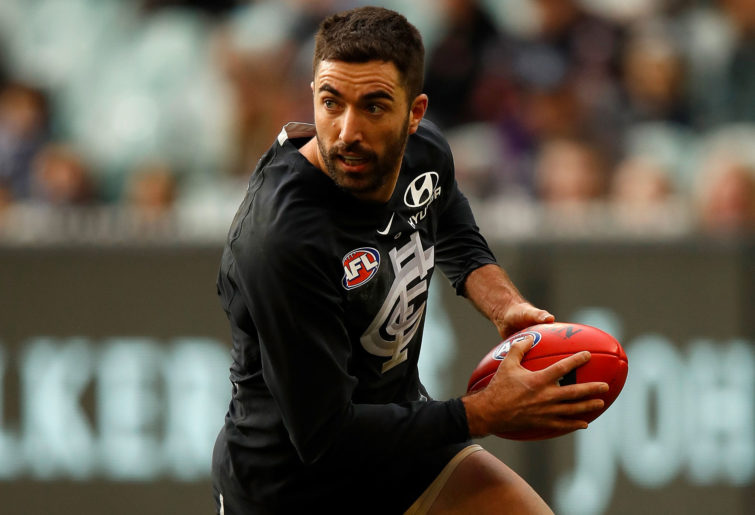
(Photo by Michael Willson/AFL Media/Getty Images)
John Schultz (Footscray 1958-68)
188 games, 37 goals
The last of a litany of big men to be part of the S team, John Schultz was an elegant and effective tap ruck man who was especially noted for his fair play. Although he was knocked unconscious within 20 seconds of his league debut, he recovered to become one of the most brilliant ruck men of the 1960s, representing Victoria on 24 occasions and winning five best and fairest awards. Schultz was a popular winner of the 1960 Brownlow Medal, and seen as one of the toughest opponents to face by players of the era. Appropriately enough, he served on the tribunal after his playing career was over, and had the honour of presenting the 2016 premiership cup to the triumphant Bulldogs. Schultz was named in the back pocket of Footscray’s Team of the Century.
Up next is the T team, with some current stars and a legend from even pre-VFL days.



































































































